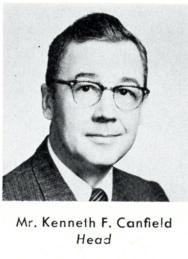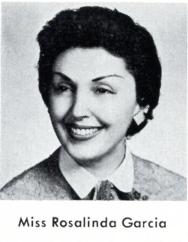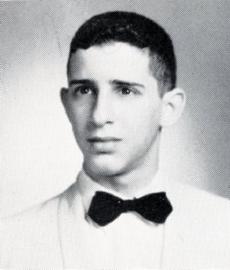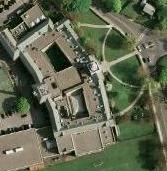
When I got closer, I recognized Miss Garcia, a Spanish teacher. She was, in pantomime, indicating that she was quite cold, by crossing her arms across her chest, shivering, and rubbing her hands up and down. Indeed, we all knew it to be a rather chilly Fall day, and it seemed clear that she had somehow gotten trapped on the roof. At this point, Mr. Canfield came into the room, and seemed perturbed to find all the students at the windows. "Asseyez-vous, asseyez-vous", he said ("sit down, sit down"). The students tried to tell him what was going on: "But Mr. Canfield, Miss Garcia is ...". Mr. Canfield, who taught French with a strong emphasis on speaking, interrupted firmly. "En français, s'il vous plait. On ne parle que le français dans la salle de classe" ("In French, please. We speak only French in the classroom"). Well, that was a problem, since our French was rather primitive. But one advanced and enterprising student quickly consulted a dictionary, and managed to come up with, "Monsieur Canfield, Mademoiselle Garcia est sur le toit" ("Mr. Canfield, Miss Garcia is on the roof"). Upon hearing this in French, Mr. Canfield seemed to understand it for the first time. He gazed myopically out the window for a few seconds, not knowing exactly where to look.
We later heard that after the class, Mr. Canfield passed by the school office to pick up his mail. While there, he said to one of the secretaries in the office, "By the way, did you know that Miss Garcia is on the roof?". "Yes, we found out," came the reply, "and she's no longer speaking to you." Miss Garcia had gone up to the roof to get a breath of fresh air, and the door had closed behind her and locked. I have one other particular memory of Mr. Canfield. At some point later in the year, he was teaching one way to say "only" in French, using the "ne ... que" construction. Calling on a girl who was one of the more advanced students in the class, he asked her to translate the sentence, "I love only you." She correctly answered, "Je n'aime que toi." Mr. Canfield closed his eyes, a dreamy look came over his face, and he murmered, "Ah, merci!"
Like all college-bound students (in Great Neck, the vast majority), I considered studying a foreign language to be a requirement for college admission. If I had known then about the enormous growth that was to occur in the Hispanic population of the United States, I might have chosen to study Spanish, but at the time, I selected French (my third possible choice was German). That's how I was placed in the Beginning French classroom of Mr. Canfield. As it turned out, the study of French was to become an important part of my life, but I didn't know that back then. Nor did I appreciate the immense value of Mr. Canfield's approach to the language, emphasizing the spoken language at a time when many teachers focused primarily on reading and writing. I ultimately studied three more foreign languages (in order, German, Spanish, and Italian), and it's from speaking them that I get the greatest pleasure. It may well be that it was Mr. Canfield who planted the seed that blossomed into this major part of my life. With Mr. Canfield's verbal emphasis, it wasn't long before he began to require the students to speak only French in the classroom, as noted in the story above. At the outset, of course, this meant that we couldn't say very much, but it's a way of encouraging your brain to begin working in the foreign language. Quite a few years later, I got a summer job in a Paris suburb, and spoke exclusively in French the entire summer. The result was that my French improved by leaps and bounds. You can read about that summer in my blog entry entitled "Le stage".
Subsequent to posting the above, I was able to contact Mr. Canfield's son, Kenneth F. Canfield, Jr. He sent me the following information about his father:
"My father's central interest in life was everything about France - language, literature, poetry, art, politics, industry, etc. We were told frequently that he spoke French more fluently than most natives of France. He taught evening French classes at both Queens College and Hofstra. He received a Fulbright Scholarship to teach English, as an exchange teacher, assigned to the Athénée Royal de Liège (Liege is in the French speaking portion of Belgium) for one year in 1952-3. He wrote a book on French Poetry which was published. He was decorated by the French Government for his contributions to greater understanding between France and the USA. On retiring from the Great Neck schools, he and my mother settled in Hanover, NH, where Dartmouth provided him with classroom space to teach courses in French language and culture. He was responsible for introducing the teaching of French in Great Neck elementary schools.
One thing I quickly found out, starting from kindergarten, is that all teachers in the system knew my father. Later I found out that the reason for this was that my father had been elected by his fellow teachers to represent them in salary negotiations with the Board of Education."   |
 When I showed up for Mr. Canfield's Beginning French class one crisp Autumn day, I found that earlier arrivals had not taken their seats, but rather were clustered by the window. They were staring up across the courtyard, where someone on the roof was gesturing in an animated fashion.
When I showed up for Mr. Canfield's Beginning French class one crisp Autumn day, I found that earlier arrivals had not taken their seats, but rather were clustered by the window. They were staring up across the courtyard, where someone on the roof was gesturing in an animated fashion.
 Seeing him (the head of her department) at the window, Miss Garcia began waving her arms in the air vigorously. Suddenly, his face broke into a smile of recognition. Seeing her waving, what did he do? He waved back! And then he seated his class, and started conducting the day's lesson. Since the students, quite distracted, kept looking out the window, Mr. Canfield pulled down the shades.
Seeing him (the head of her department) at the window, Miss Garcia began waving her arms in the air vigorously. Suddenly, his face broke into a smile of recognition. Seeing her waving, what did he do? He waved back! And then he seated his class, and started conducting the day's lesson. Since the students, quite distracted, kept looking out the window, Mr. Canfield pulled down the shades.
 The photos above come from the 1959 Arista, my high school yearbook. Since I've found it, I guess this is a good place to show my own yearbook picture, seen to the left. If I recall, these were official graduation class photos taken by the school. I have to say that I think I've gotten better looking over the last fifty years.
The photos above come from the 1959 Arista, my high school yearbook. Since I've found it, I guess this is a good place to show my own yearbook picture, seen to the left. If I recall, these were official graduation class photos taken by the school. I have to say that I think I've gotten better looking over the last fifty years.
 The picture to the right shows a modern satellite view of Great Neck North Senior High School. It was called just Great Neck High School when I entered it in the tenth grade in September, 1956, at age 14. The word "North" was not added to its name until a new school was opened in the southern part of great Neck in 1958. I didn't start high school until the tenth grade, since prior to the opening of Great Neck South, overcrowding had moved the ninth grade, normally part of a high school, down to the Junior High. I'm showing this image so that readers not familiar with the building can see that it had two internal courtyards. Mr. Canfield's classroom was on the inside, so it had a view out into one of these courtyards.
The picture to the right shows a modern satellite view of Great Neck North Senior High School. It was called just Great Neck High School when I entered it in the tenth grade in September, 1956, at age 14. The word "North" was not added to its name until a new school was opened in the southern part of great Neck in 1958. I didn't start high school until the tenth grade, since prior to the opening of Great Neck South, overcrowding had moved the ninth grade, normally part of a high school, down to the Junior High. I'm showing this image so that readers not familiar with the building can see that it had two internal courtyards. Mr. Canfield's classroom was on the inside, so it had a view out into one of these courtyards.